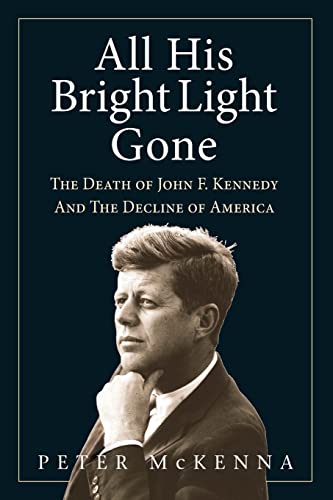"Impressively well researched, written, organized and presented... a compelling, informative,thoughtful. and thought-provoking read frombeginning to...
Read more
end. Very highly recommended for community, college, anduniversity American Political Science collections in general and fornon-specialist general readers with an interesting understanding how theAmerican political climate has changed over the last half century." Midwest Book Review"An excellent and informative book... There is no denying Mc Kenna'sthoroughness, which helps us understand that the long term consequencesof losing Kennedy have never been confronted and the harm done by some of the presidents who followed him has gone largely unaddressed." Book Pleasures WHAT THE BOOK IS ABOUT All His Bright Light Gone: The Death of John F. Kennedy and the Decline of America. It is the first book about Kennedy to explore the ways his untimely death changed this country. We see him first as a chronically ill young boy. In his sickbed, he readsvoraciously about history, world affairs, and government. A Kennedyfamily friend who visits him in the hospital finds him "so surrounded bybooks I could barely see him...this young child was reading The World Crisis by Winston Churchill." Then, as a young man, Kennedy's concentrates his curiosity on the strengthsand weaknesses of various forms of government. He studies politicaltheory at Harvard and later supplements his education by traveling tonearly every continent on the globe. Then, constantly ill andweighing just 130 pounds, he forces his way into combat. The horrors ofWorld War II,the deaths of his brother and sister, and his belief thathis life will be short, heighten his perception of the ephemeral natureof existence and his sense of empathy for the suffering of others. After years of study and travel,Kennedy enters public service. He believesthe United States has been blessed with the most effective system ofgovernment ever devised by man, a republic based on democraticprinciples. When he becomes president, his goal is to create a modern-day version of this system. As the reader learns, Kennedy reachedhis goal because he knew that a republic will succeed only whenthe people respect government and participate in its affairs. Thisconcept was part of the original design of the Founders, and as Kennedyunderstood, it is necessary for our success as a nation. Thisis why, just minutes in tohis presidency, he famously challenged thepeople to ask what they could do for their country. This is why herepeatedly said that government is a noble profession, the key to oursuccess as a nation. This is why he held more than60 press conferencesin less than three years, drawing the people into government. He was thelast great champion of participatory democracy. The book sayssomething that has never been said before: Kennedy's approach togovernment was abandoned after his death, with disastrous results for the nation. Subsequent presidents did not reinforce the bond between thepeople and government. Ronald Reagan, for example, demonized governmentin the eyes of the people, a strategy that dangerously weakened ourrepublic. Today, government has become gridlocked, unable toaddress the needs of the people. Lawmakers fight pointless ideologicalbattles, something Kennedy warned against, and the objectivity that hecalled for has evaporated.
Hide more




